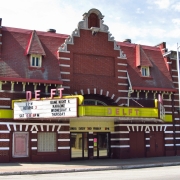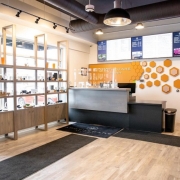Michigan’s small communities getting big boost from legal marijuana
Bridge Michigan has an excellent in-depth feature exploring the impact of recreational marijuana on small communities in Michigan that have embraced legal cannabis:
“We’ll see anywhere from 450 to 800 people a day,” said Kyle Miller of Meds Cafe, as locals and customers from Lansing to Grand Rapids pulled in for curbside pickup of their favorite stash.
Lowell City Manager Michael Burns said he is high on what marijuana can do for this town, a quiet place of about 4,100 people on the Grand River some 15 miles east of Grand Rapids. Lowell boasts two recreational marijuana shops, where cannabis flower goes for upwards of $50 per one-eighth ounce, and has given approval for two more shops, two growing operations and three microprocessor marijuana businesses.
Burn views this burgeoning industry as a community cash register.
“I think the tax revenue for the city could be significant,” he said. “I am hoping I can add another full-time police officer. I am hoping there is more for roads.”
…Kalkaska Village President Harley Wales told Bridge that revenue from marijuana is bringing optimism to a town that some now jokingly call Kal-Hash-Ka.
The village of 2,000 people has three retail pot shops — all sharing the same parking lot — with approval for up to five more shops licensed for adult recreational as well as for medical marijuana, which was first approved in Michigan in 2008.
According to Wales, an industrial park in the community now has 15 licensed marijuana supply businesses, 11 already in operation. He said the largest grower employs about a 100 workers, at wages that start at about $15 an hour.
…Bridge Michigan interviewed officials, store owners and residents in three communities that have fallen hard for pot — Lowell, Webberville and Kalkaska. Their reviews are mostly positive, both in the boost to local budgets, and jobs provided by retail and grow operations. As for a feared spike in crime or drug abuse, local education and law enforcement officials say there is no early evidence of that.
According to Michigan’s Department of the Treasury, the excise tax brought in $31 million in fiscal 2019-2020 — which left just $11 million to be divided among local and county governments, schools and roads.
But tax revenue is expected to jump in the coming years. The Senate Fiscal Agency projects about $1.5 billion in sales, producing $154 million excise tax revenue, in fiscal year 2022-23. Fifteen percent of that means roughly $23 million for local communities. Getting a slice of that pie may not turn heads in bigger cities like Grand Rapids, but for a small town like Lowell, with a general fund budget of $3.2 million, a boost of several hundred-thousand dollars is significant.
There’s lots more to read over at Bridge & you can see all of Michigan’s 162 (and counting) recreational dispensaries on our map!
image courtesy Pincanna Kalkaska on Instagram












